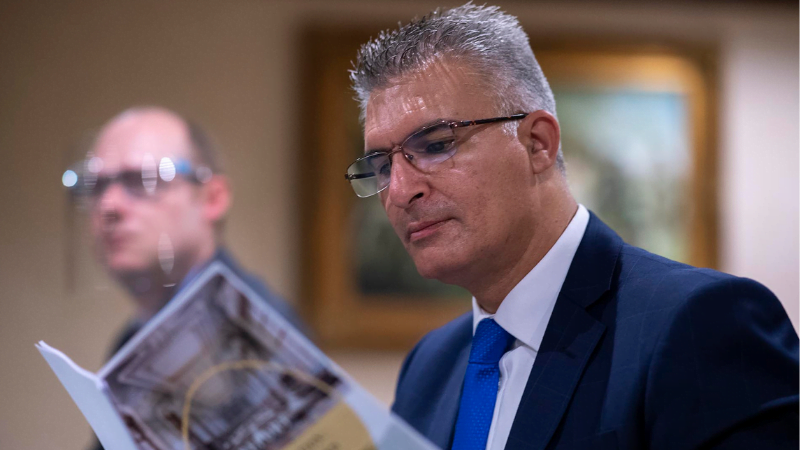The government has adopted multiple Council of Europe (CoE) resolutions on media freedom, including ones to protect journalists, ensure an end to impunity for those who harm them, and categorise crimes against journalists as a separate and more severe type of crime.
Four resolutions in total include those on “freedom of expression and digital technologies”, “the safety of journalists”, “the changing media and information environment” and “the impacts of the COVID-19 pandemic on freedom of expression”.
They were tabled at the CoE Conference of Ministers responsible for the Media and Information Society “Artificial Intelligence- Intelligent Politics” event held online between 10-11 June.
Minister within the Office of the Prime Minister Carmelo Abela was present on behalf of the Maltese government.
The most notable of the resolutions was the one on the safety of journalists which means they will “dedicate specific attention and resources to stemming impunity for killings of, attacks on and ill-treatment of journalists and other media actors”.
They intend to do this by providing “early warning mechanisms and threat assessments”, and ensuring that investigations into such crimes are “prompt and effective”, recognising crimes against journalists as a dedicated category of crimes or an aggravated circumstance, resulting in higher penalties. Additionally, they intend to provide practical and operational measures to stem impunity.
The Maltese government has also promised to “swiftly and decisively condemn any attacks on journalists” including their family members, as attacks on democracy and will afford such cases coordinated action at the highest political level. The most pressing question would be how the party in government intends to move from the present state where its online groups foment attacks against journalists to the standards required in the resolution.
On the topic of murdered journalists, the resolution states that prevailing impunity fuels further threats and attacks against media workers. The resolution comes 44 months since the assassination of journalist Daphne Caruana Galizia, which is increasingly linked to the highest corridors of power with limited if no action taken against alleged politicians involved and high level members in institutions that are accused of enabling impunity. The party in government also stalled the public inquiry and attempted to limit its remit and duration.
This is a “serious concern” to member states and the impunity rate of around 90% is not acceptable. The resolution states that “Council of Europe Member States too frequently fail to fulfil their obligation to conduct prompt and effective investigations and prosecutions of these crimes, falling short of bringing those responsible to justice.”
While the resolutions didn’t mention any names, Malta is yet to convict anyone of the assassination of Daphne Caruana Galizia, and the criminal cases are moving along at a very slow pace.
The Maltese government has promised to create a national action plan dedicated solely to ensuring the safety of journalists. This will include priorities based on urgency, fuelled by strong political and operational leadership.
“We commit to devise, based on Council of Europe Recommendation CM/Rec(2016)4 and best practices of Council of Europe member States and other jurisdictions, dedicated national action plans on the safety of journalists, setting a comprehensive and effective program of activity, with urgency-based priorities and adequate resources for their implementation,” the resolution reads.
It adds that it will be supported by the effective involvement of civil society, academics, journalists, and professional associations.
The action plan to which the authorities have committed will also address the specific risks and challenges faced by women journalists, including in the online sphere.
“We furthermore resolve to appropriately address the threats, abuse, and intimidation faced by journalists and other media actors on grounds of their race, colour, ethnic or national origin, language, religion or sexual orientation, or other personal characteristics,” it continues.
Malta subsequently agreed that journalists and media actors are public watchdogs, “instrumental for the healthy operation of democracy,” and require appropriate protection as such.
Other promises made include tackling online electoral communication, campaigning, and media coverage to ensure fair electoral processes. This should include governmental support of impartial fact-checking and the promotion of “diverse and reliable professional media sources.”
In addition to these important pledges, Malta has also stressed its commitment to ensuring that the integration of technology like AI into public communication and the media, takes place with full respect for human rights, in particular freedom of expression.
Furthermore, they will ensure that the population has access to diverse media and that they give all media equal access to training, innovative data, digital skills, and media literacy education.
Malta will “take all necessary steps to implement the actions” and will regularly review and report on the measures taken, including in the ministerial conference format.
The adoption of these resolutions comes just days after Malta adopted a UN resolution to fight corruption.
It signed off on an 87 point document promising to “investigate, prosecute, and punish threats and acts of violence” against journalists, provide a “safe and enabling environment” for whistleblowers, and ‘take effective measures” to “prevent, investigate, and prosecute” corruption involving public officials.
Its promises come at a time when the country is suffering from democratic backsliding and significant issues with corruption. Just this year, it scored its worst-ever mark in the Transparency International corruption perception index. On the World Press Freedom Index, Malta plummeted 32 places in three years.
Issues that contributed to this year’s poor result included Prime Minister Robert Abela’s attempts to stop the inquiry into Caruana Galizia’s assassination, the use of SLAPP, and defamation suits against journalists, a deeply divided media with little plurality, and problems with propaganda.












